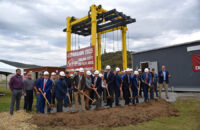Virginia Beach maritime contractor to hire 86 workers
Virginia Beach maritime government contractor Anchor Innovation plans to add 86 jobs as part of an expansion, Gov. Glenn Youngkin announced Thursday. Founded in 2002, Anchor Innovation is a service-disabled, veteran-owned contractor providing marine maintenance and support to the U.S. Navy, including vessel repairs and upgrades. Anchor Innovation plans to invest $213,000 on the expansion, [&hellip[...]
Youngkin-Senate university dispute heard by Virginia Supreme Court
The ongoing battle between the governor and Virginia Senate Democrats over university board control continued Thursday in the confines of the Supreme Court of Virginia.
VFP investing $35M to expand Scott facility
VFP will invest $35 million to expand its Scott County facility, doubling capacity and creating 200 manufacturing jobs.
AstraZeneca to invest $4.5B in Albemarle manufacturing plants
AstraZeneca will invest $4.5 billion to establish two new manufacturing facilities in Albemarle County and create 600 direct jobs.
State to allocate $15M to support workforce housing
The Virginia Workforce Housing Investment program will distribute an additional $15 million to support workforce housing development.
Colonna’s Shipyard invests $79M to build 4th drydock
Norfolk-based Colonna’s Shipyard announced Friday that it has invested $70 million to acquire its fourth drydock.
Dover Food Retail to add 300 jobs in Chesterfield
Dover Food Retail will soon invest over $20 million to expand its Virginia operations, adding 300 jobs in Chesterfield County.
Women execs have tougher climb to top rung
We’ve written about glass ceilings and glass cliffs, but to quote the Beatles, let’s look through the glass onion. What’s the glass onion? Well, it’s a metaphor I’m using to describe the multilayered challenges facing women who aspire to be CEOs. The good news is, there are more female CEOs than in years before, including […]
Area Development ranks Virginia No. 1 for workforce training
The Virginia Talent Accelerator Program has been ranked the top workforce training program in the nation by Area Development magazine.
Eli Lilly to invest $5B in Goochland plant, creating 650 jobs
Pharmaceutical giant Eli Lilly & Co. plans to invest $5 billion in a manufacturing facility in Goochland County expected to create 650 permanent jobs.
ABB announces $28.5M expansion in Henrico, adding 100 jobs
ABB will invest $28.5 million to expand operations in Henrico County, creating more than 100 jobs in the next three years.
Government contractor to add 1,200 jobs in Alexandria and Fairfax
Systems Planning & Analysis (SPA) announced Thursday it plans to expand its headquarters, increase its presence in Fairfax County and create more than 1,200 jobs.























